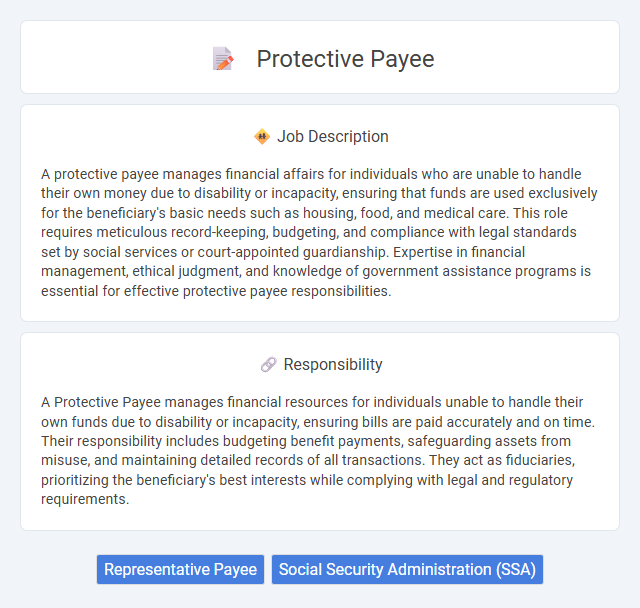
A protective payee manages financial affairs for individuals who are unable to handle their own money due to disability or incapacity, ensuring that funds are used exclusively for the beneficiary's basic needs such as housing, food, and medical care. This role requires meticulous record-keeping, budgeting, and compliance with legal standards set by social services or court-appointed guardianship. Expertise in financial management, ethical judgment, and knowledge of government assistance programs is essential for effective protective payee responsibilities.
Individuals managing the Protective Payee role typically work with clients who have mental health challenges, disabilities, or financial vulnerabilities, making empathy and reliability crucial. Those with strong organizational skills and a compassionate nature are likely to be well-suited for this job, as they need to handle finances responsibly and advocate for their payees' best interests. People who are uncomfortable with accountability or lack attention to detail may find this role challenging and less suitable.
Qualification
A Protective Payee must have a high school diploma or equivalent, with strong organizational and financial management skills essential for overseeing beneficiaries' funds. Experience in social services, accounting, or related fields enhances the ability to manage budgets, pay bills, and ensure compliance with legal requirements. Certification or training in fiduciary responsibilities and knowledge of state-specific protective payee regulations further qualify candidates for this role.
Responsibility
A Protective Payee manages financial resources for individuals unable to handle their own funds due to disability or incapacity, ensuring bills are paid accurately and on time. Their responsibility includes budgeting benefit payments, safeguarding assets from misuse, and maintaining detailed records of all transactions. They act as fiduciaries, prioritizing the beneficiary's best interests while complying with legal and regulatory requirements.
Benefit
A Protective Payee job likely involves ensuring that vulnerable individuals receive and manage their benefits responsibly, reducing the risk of financial abuse. This position probably provides peace of mind to families and guardians by securely handling funds and paying bills on behalf of beneficiaries. The role potentially enhances clients' financial stability and access to necessary resources through careful oversight and management.
Challenge
The role of a protective payee likely involves significant challenges related to managing someone else's financial affairs with strict accountability and transparency. There is probably a consistent need to balance safeguarding the beneficiary's funds while ensuring their needs and expenses are adequately met. Navigating complex regulations and maintaining clear communication with both the beneficiary and relevant agencies could frequently complicate the job.
Career Advancement
Protective payees manage finances for individuals unable to handle their own funds due to disability or incapacity, ensuring bills are paid and funds are allocated appropriately. Career advancement in this field often involves gaining certifications such as Certified Financial Planner (CFP) or Social Work licensure, enhancing expertise in financial management and client advocacy. Opportunities for growth include roles like senior protective payee, case manager, or positions within nonprofit organizations specializing in guardian services.
Key Terms
Representative Payee
A Representative Payee manages Social Security or disability benefits for individuals who are unable to handle their own finances due to mental or physical impairments. This role ensures that funds are used strictly for the beneficiary's essential needs, such as housing, food, and medical care, while maintaining accurate financial records. Effective Representative Payees must adhere to federal guidelines and demonstrate accountability to safeguard the beneficiary's financial well-being.
Social Security Administration (SSA)
A Protective Payee appointed by the Social Security Administration (SSA) manages and safeguards the Social Security benefits of individuals unable to manage their own finances due to mental or physical impairments. The Protective Payee is responsible for ensuring that the Social Security payments are used primarily for the beneficiary's current and foreseeable needs, such as housing, food, and medical care, in compliance with SSA regulations. Strict reporting and documentation to the SSA are required to maintain transparency and accountability in the use of the beneficiary's funds.
 kuljobs.com
kuljobs.com